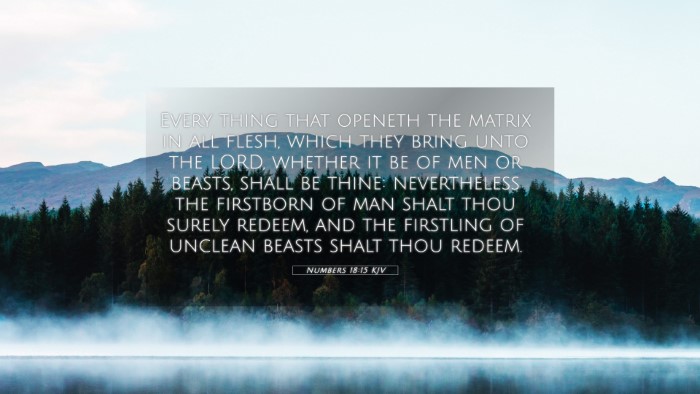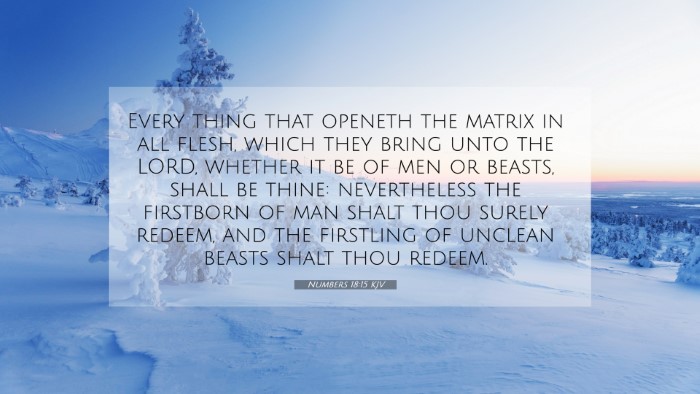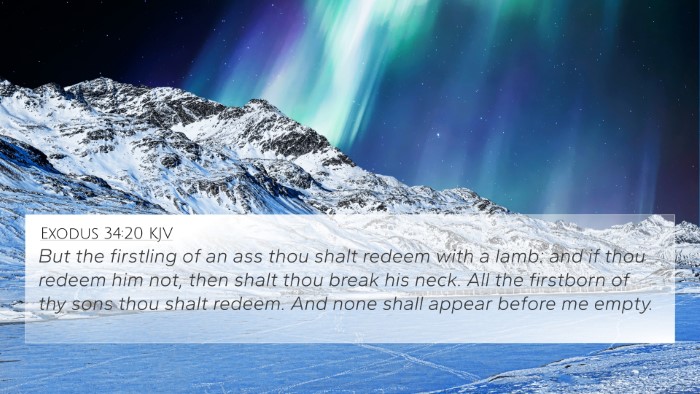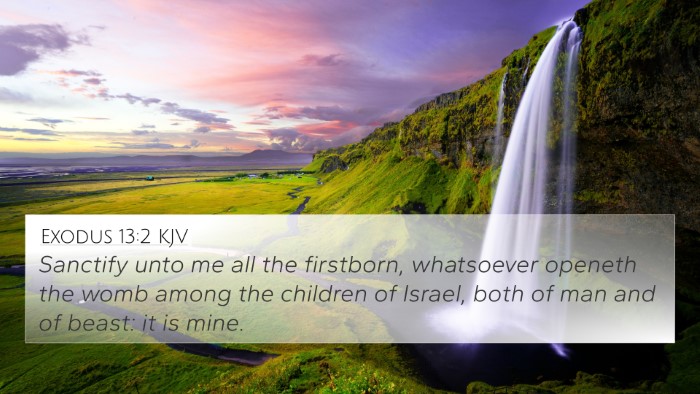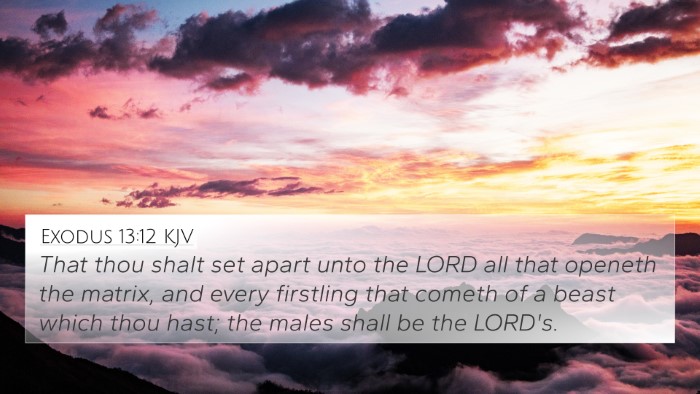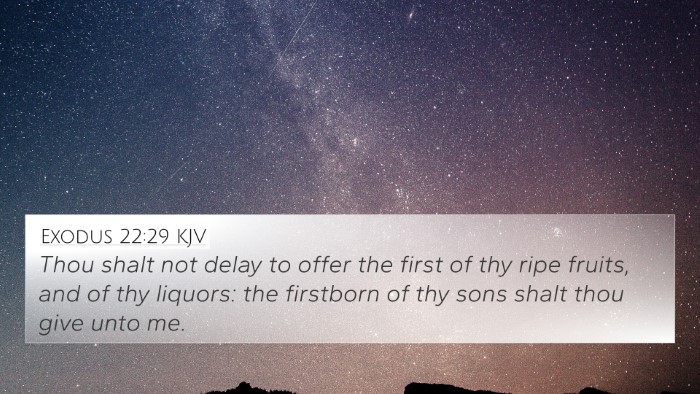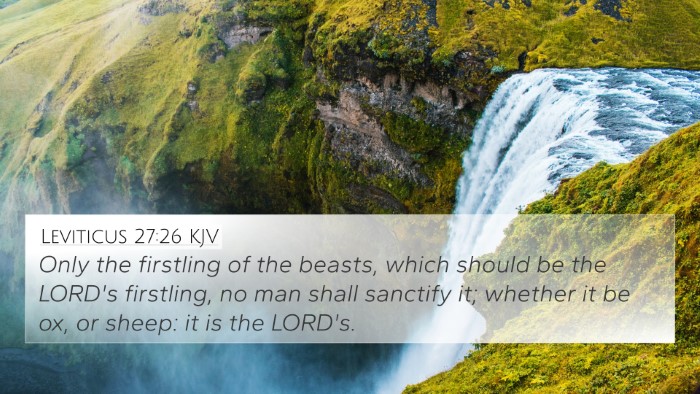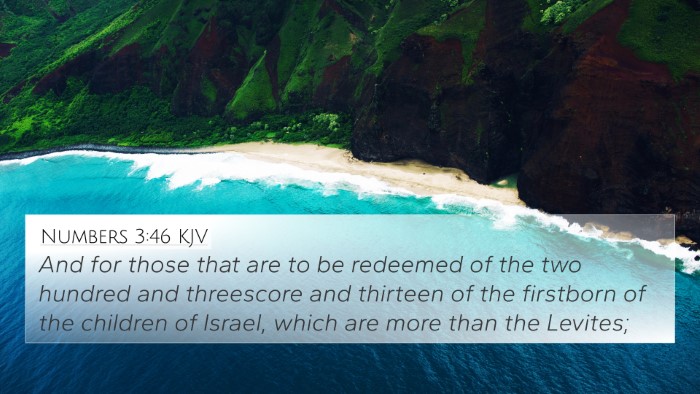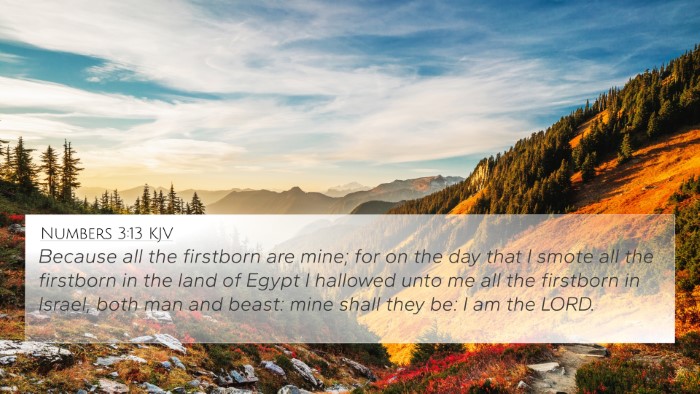Understanding Numbers 18:15
The verse Numbers 18:15 states:
"Every thing that openeth the matrix in all flesh, which they bring unto the Lord, whether it be of men or beasts, shall be thine: nevertheless the firstborn of man shalt thou surely redeem, and the firstling of unclean beasts shalt thou redeem."
This verse is part of the laws concerning the Levitical priesthood and highlights the significance of the firstborn in Israelite tradition. Public domain commentaries such as those by Matthew Henry, Albert Barnes, and Adam Clarke offer profound insights into this verse.
Key Themes and Meanings
- The Sacredness of the Firstborn: The firstborn in both humans and animals were regarded as sanctified to the Lord. This reflected their importance in the covenant relationship between God and Israel, as the firstborn represented a pledge of the family's identity and heritage.
- Redemption Principles: The instruction to redeem the firstborn highlights a theological principle of substitution and redemption, prefiguring Christ's ultimate sacrifice for humanity. The concept signifies that while the firstborn belongs to God, they can be redeemed through a specific offering, emphasizing God's mercy in asking for a lesser offering.
- Role of the Priests: This provision underscores the role of the priests as the mediators between God and the people. They were to oversee the offerings and maintain the holiness associated with the firstborn, reflecting the responsibilities bestowed upon them.
- Unclean Beasts Specificity: The distinction between clean and unclean animals shows God's holiness and the provisions He made for the purity of worship. The firstborn of unclean animals could not be offered and had to be redeemed, indicating a structured, intentional worship system.
Cross-References to Further Understand Numbers 18:15
- Exodus 13:12-15: Discusses the consecration of the firstborn and the command to redeem them, reinforcing the themes in Numbers 18:15.
- Leviticus 27:26-27: Provides regulations regarding the valuation and redemption of the firstborn, reflecting the practice underscored in Numbers.
- Romans 8:23: Offers insight into the concept of redemption awaiting believers, paralleling the idea of firstborn redemption.
- Luke 2:22-24: The presentation of Jesus as the firstborn in the temple ties directly back to the principles in Numbers.
- Hebrews 10:10: Discusses the ultimate sacrifice of Christ, connecting with the theme of redemption established in this verse.
- Exodus 34:19-20: Underlines the idea that the firstborn among animals must be redeemed, reinforcing the importance placed upon these instructions.
- Colossians 1:15: Describes Christ as the firstborn over all creation, linking to the themes of primacy and redemption found in Numbers 18.
Connecting Themes and Biblical Context
This verse can be understood more fully by examining the interconnectedness of the Bible. Here are key connections:
- Old Testament Foundations: The requirement of redemption for the firstborn can be traced back to the Exodus, where God spared Israel's firstborn during the Passover, establishing a framework for gratitude and acknowledgment of His mercy.
- New Testament Fulfillment: The theme of firstborn and redemption reaches its peak in the New Testament through Christ, who is the ultimate firstborn and sacrificial lamb.
- Priestly Duties and Offerings: The role of priests in managing the sacrifices is a significant theme running through the Pentateuch and finds resonance in the New Testament's portrayal of Jesus as our High Priest.
Tools for Bible Cross-Referencing
To delve deeper into the connections between Bible verses, various resources are available:
- Bible Concordance: A helpful tool to find specific words and topics across the Scriptures.
- Bible Cross-Reference Guides: Publications that help systematically cross-reference verses.
- Cross-Reference Bible Study Methods: Techniques to analyze and connect verses in thematic studies.
- Comprehensive Bible Cross-Reference Materials: These provide extensive listings of cross-references for deeper study.
Conclusion
Numbers 18:15 serves as a poignant reminder of God’s order, mercy, and the significance of the firstborn in both Old and New Testament contexts. By exploring related verses and utilizing cross-referencing tools, individuals can develop a richer understanding of Biblical themes and their implications in the greater narrative of Scripture.

